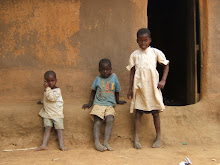The air just rests against my skin ... neither hot nor cold ... just there. The only time I am aware of temperature here is at noon if the sun is shining and I am walking quickly or carrying a load, and once, yesterday in fact, when rain teemed down from a grey sky, the wind blowing it in sheets past the rondavel in which we sat to eat lunch.
Someone in some book wrote of the flavours of Africa rather than smells. Whoever it was captured it well. It is like a symphony of odours, some subtle, some rising in great crashing crescendos. Or a fabric woven from many different strands of thread, some thick and deeply shaded, others fine and light. And it isn't just the smells that weave themselves together into a fabric that immediately conjures up Africa. It is also the sights, and the sounds that are unmistakeably African.
Weaving its way through the whole fabric is the warm sweet smell of the wood and charcoal fires, and the meat cooking over them. There is one alley way I pass each day where someone roasts chicken over an open fire and my mouth waters.
The most penetrating smell is that of the pigs rooting about in the rotting produce. They feast at night and are joined in the morning by an old man whose stick turns over patches of garbage, seeking something of value they haven't yet devoured. A strong wind blowing in the wrong direction makes me hold my breath till I pass the mound. Later you see the same pigs lolling about in the sunshine sleeping off their gluttony.
After the rains the air is clean but the ground turns into slippery red sludge and I make my hesitant way hopping from one rock to another, avoiding the freshly wet green cow dung whose odour rise from the steaming mud.
My waking hours are filled with sound that begins with the birds that wake me at 5:30 and ends with laughter and music from the surrounding neighbourhoods to which I fall asleep at night. Everywhere I walk music accompanies me, lifting my feet and my spirits in a way I cannot describe and which doesn't happen anywhere else in the world that I know of. And always the background murmur of Luhya and Kiswahili. In town every mode of transport adds its own raucous noise to the cacophony of the streets. Matatu horns blare. Bicycle bells jangle. A truck roars as it struggles up a hill belching out black smoke and leaving in its wake the stench of petrol fumes that slowly dissipate to be replaced by perfume wafting from nearby flowering trees.
Someone sells tiny vials of perfume on the main road and a man dabs some behind his ears. Mostly people just smell like clean bodies in open air, but occasionally the sharp acrid smell of stale sweat overpowers me in an enclosed space.
The streets are alive on Saturday morning as people come to buy and sell at the markets. Women sit sideways on boda bodas, their legs sedately crossed, perfectly balanced. A troop of nursing sisters parades past, their black faces framed by white head pieces. Another woman walked past balancing an enormous clay cooking pot on her head. So many bicycles, matatus and pickups bursting with people on the move. Goods are carried on heads, on the backs of bicycles, in wooden wheel barrows, on the tops of sagging matatus. It is an entrepreneurial society ... thousands of small business people selling everything from batteries to second hand clothing and linens to fresh produce to plastic bags. I wonder how they all survive when so many sell the same thing. There is some sense of order in the market ... specialties like dresses or shirts or pants or linens ... but still so many vying for the few shillingi available.
Wednesday, May 28, 2008
Subscribe to:
Post Comments (Atom)


No comments:
Post a Comment